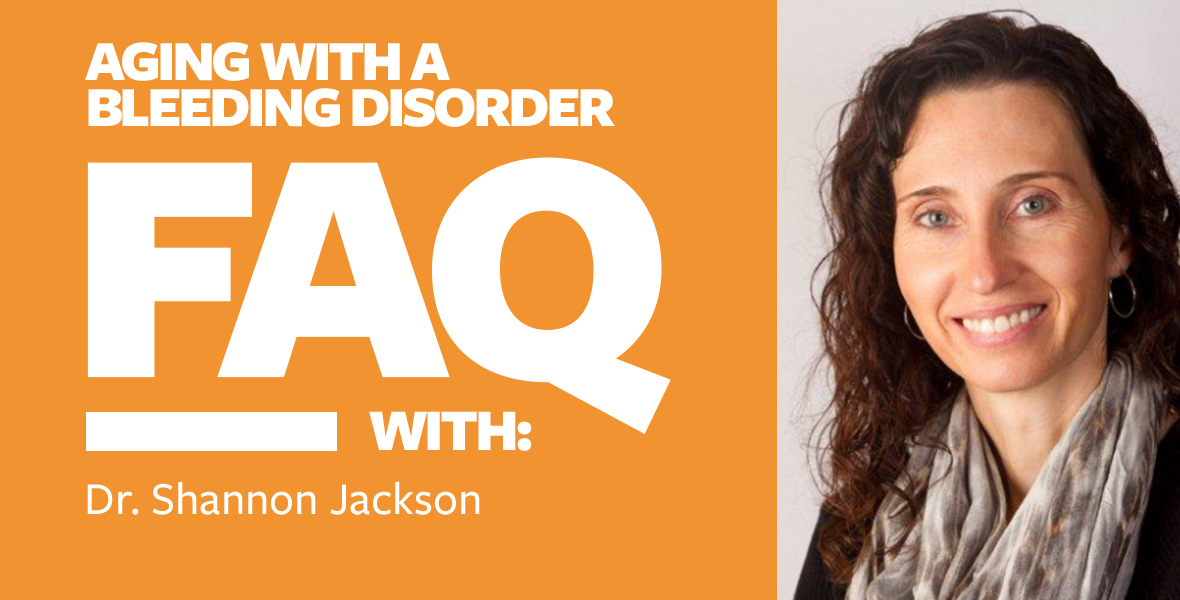Aging with a Bleeding Disorder
Explore the various frequently asked questions below concerning aging with a bleeding disorder. Also feel free to download or print the resource. Special thanks to Dr. Shannon Jackson for providing the information for the FAQs.
- Will my bleeding disorder change during or after menopause? How?
- How do I manage other health concerns when emergency room doctors or family doctors are unfamiliar with my bleeding disorder?
- How do I prepare for any surgeries I may need?
- What specific issues should I be aware of as I age with a bleeding disorder?
About The Author
Dr. Jackson is a hematologist primarily interested in non-malignant blood conditions including inherited and acquired bleeding disorders. She is a co-founder of West Coast Hematology, practices at St. Paul’s Hospital and is a Clinical Professor of Medicine at UBC. She is the Medical Director of the Adult Provincial Bleeding Disorders Program with a background of investigator initiated clinical research. Dr. Jackson is passionate about measuring health outcomes that matter to patients and transforming to a Value Based Health Care model of care. She has trained with Dr. Michael Porter at Harvard University, obtained her Green Belt Certification from the Value Based Health Centre of Europe and is currently completing her Masters in Health Care Transformation with Dr. Elizabeth Teisberg and the Value Institute for Health and Care, at the University of Texas Austin. Dr. Jackson is working as the Physician Lead for Value Based Health Care at Providence Health Care and a member of the Physician Advisory Committee for Quality, Safety and Value.
Menopause is defined as the point in time a woman has had no menstrual period for 12 consecutive months and each women experiences this natural phase of life differently. Prior to menopause many women experience changes in the timing and/or flow of their menstrual cycles and those with an underlying bleeding disorder may experience a more dramatic increase in flow. This can be disruptive to activities and also worsen any prior anemia due to iron deficiency. Non-menstrual bleeding tendencies do not usually change significantly in this phase of life.
Natural aging is accompanied by very gradual increases in several clotting proteins for most people. This can occur in women with some but not all types of bleeding disorders. For example, women with the lifelong bleeding disorder type 1 von Willebrand disease may have higher clotting protein levels than they did in younger adulthood. However, the impact on bleeding symptoms with aging is not always predictable.
The best way to manage the actual or possible changes in bleeding symptoms with aging and menopause is to stay connected with your bleeding disorder clinic and keep your team informed of any significant changes in bleeding tendency.
Providing education to every physician and emergency room nurse about inherited bleeding disorder would be ideal though remains a challenge because they see so few people with these conditions. Practically, we address this by recommending a patient and caregivers remain connected with a bleeding disorders program (or individual hematologist in some cases) and always carry a Factor or Treat First card. The card which contains key information about the individuals bleeding disorder and initial treatment recommendation can be presented to medical or surgical personnel. However, this is not a guarantee that the information will be taken up in a timely or effective manner. Sometimes medical and surgical professionals do not seem to take the bleeding disorder seriously which can be stressful. Some bleeding disorder programs recommend patients contact the clinic (or on call hematology, if available) directly when they are planning to present, or have arrived in an emergency room or acute care setting.
For the majority of patients with bleeding disorders it is possible to safely undergo procedures or surgeries with little to no bleeding or other complications with a comprehensive plan in place to address bleeding risk in that situation. Please contact your bleeding disorder clinic (or hematologist) as soon as possible to inform them that:
- you may undergo a procedure, even if it is not confirmed
- a procedure was recommended but not booked because of the bleeding disorder
- the type of procedure
- the proceduralist or surgeon performing the procedure
- the health care setting (office, hospital) where it will be performed
With ample advance notice the bleeding disorder clinic can assess the situation, and in some cases contact the proceduralist or surgeon for additional information or discussion.
People with bleeding disorders experience the usual physiological aging process and also must go through more minor procedures, for example colonoscopy, and sometimes major surgery such as coronary artery bypass grafting. As mentioned above, maintaining a relationship with your bleeding disorder clinic team can allow them to answer questions about planned procedures and aging with a bleeding disorder. Sometimes health care professionals who are not specialists in bleeding disorders can under or over-estimate the risk of bleeding and benefit from consultation with an expert. Injuries due to falls increase with age as changes in balance, strength and vision occur. It is important that loved ones, family and care givers all know how to get help after an injury and this is especially important with a bleeding disorder. Maintaining regular physical activity that is fun and safe is always a great idea. For patients just starting out, or who have a severe bleeding disorder it is good to start slow and increase the intensity gradually.










